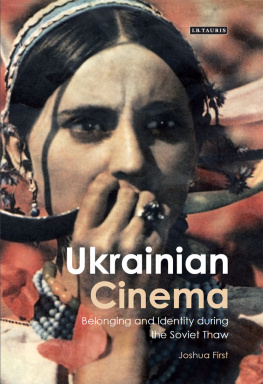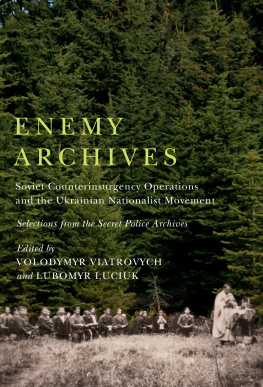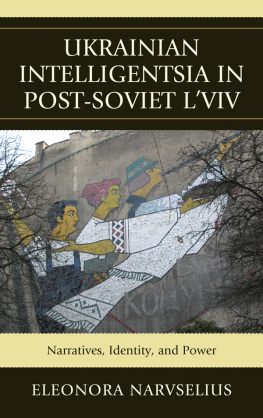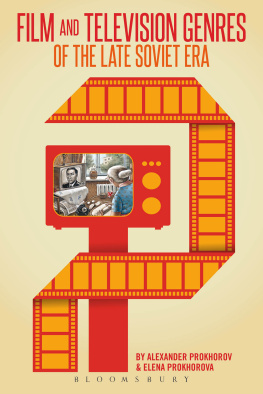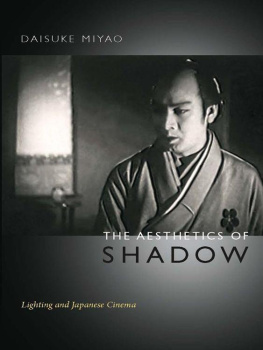Joshua First is the Croft Assistant Professor of History and International Studies at the University of Mississippi. He has published on a variety of topics related to Soviet cinema after Stalin, ranging from film audience research to melodrama to his present interest in Ukrainian cinema. He teaches courses on modern Russian and Soviet history, and on contemporary Russian politics and culture.
Published and forthcoming in KINO: The Russian and Soviet Cinema Series
Series Editor: Richard Taylor
Advisory Board: Birgit Beumers, Julian Graffy, Denise Youngblood
Performing Femininity: Woman as Performer in Pre-Revolutionary Russian Film
Rachel Morley
The Russian American Hero in Soviet Film: Cinemas Role in Shaping the Early Culture of the USSR
Marina Levitina
Through a Russian Lens: Representing Foreigners in a Century of Russian Film
Julian Graffy
Cinema in Central Asia: Rewriting Cultural Histories
Edited by Gulnara Abikeyeva, Michael Rouland and Birgit Beumers
The Cinema of Tarkovsky: Labyrinths of Space and Time
Nariman Skakov
The Cinema of Alexander Sokurov
Edited by Birgit Beumers and Nancy Condee
Eisenstein on the Audiovisual: The Montage of Music, Image and Sound in Cinema
Robert Robertson
Sergei Eisenstein Selected Works
Edited by Richard Taylor
Cinema and Soviet Society: From the Revolution to the Death of Stalin
Peter Kenez
Dziga Vertov: Defining Documentary Film
Jeremy Hicks
Film Propaganda: Soviet Russia and Nazi Germany (second, revised edition)
Richard Taylor
Forward Soviet: History and Non-Fiction Film in the USSR
Graham Roberts
Propaganda and Popular Entertainment in the USSR: The Mezhrabpom Studio
Jamie Miller
Real Images: Soviet Cinema and the Thaw
Josephine Woll
Russia on Reels: The Russian Idea in Post-Soviet Cinema
Edited by Birgit Beumers
Savage Junctures: Sergei Eisenstein and the Shape of Thinking
Anne Nesbet
Soviet Cinema: Politics and Persuasion under Stalin
Jamie Miller
Vsevolod Pudovkin: Classic Films of the Soviet Avant-Garde
Amy Sargeant
Queries, ideas and submissions to:
Series Editor: Professor Richard Taylor richtea21@hotmail.com
Cinema Editor at I.B.Tauris: Anna Coatman acoatman@ibtauris.com

Published in 2015 by I.B.Tauris & Co Ltd
6 Salem Road, London W2 4BU
175 Fifth Avenue, New York NY 10010
www.ibtauris.com
Distributed in the United States and Canada
Exclusively by Palgrave Macmillan
175 Fifth Avenue, New York NY 10010
Copyright Joshua First 2015
The right of Joshua First to be identified as the author of this work has been asserted by the author in accordance with the Copyright, Designs and Patent Act 1988.
All rights reserved. Except for brief quotations in a review, this book, or any part thereof, may not be reproduced, stored in or introduced into a retrieval system, or transmitted, in any form or by any means, electronic, mechanical, photocopying, recording or otherwise, without the prior written permission of the publisher.
Every attempt has been made to gain permission for the use of the images in this book. Any omissions will be rectified in future editions.
References to websites were correct at the time of writing.
KINO: The Russian and Soviet Cinema Series
ISBN: 978 1 78076 554 9
eISBN: 978 0 85773 626 0
A full CIP record for this book is available from the British Library
A full CIP record is available from the Library of Congress
Library of Congress Catalog Card Number: available
LIST OF ILLUSTRATIONS
Chapter 1
The Friendship of Peoples in Ivan Pyrevs Tractor Drivers (1939)
Domesticated Nationality in Ivan Pyrevs Tractor Drivers (1939)
The Stalinist Folkloric in Ihor Savchenkos Bohdan Khmelnytskyi (1941)
The Hetman willfully signs the Pereiaslav Treaty with the Russians in Bohdan Khmelnytskyi.
Chapter 2
Taras, the unkempt Ukrainian projectionist in Oleksii Mishurins The Gas Station Queen (1963)
Chapter 3
To the authors of Shadows of Forgotten Ancestors, drawing from 19 November 1964 in Radianska kultura
Camera movement emulates impressionistic painting in Shadows of Forgotten Ancestors
Flattening of space in Sergei Paradjanovs Shadows of Forgotten Ancestors (1965)
Subjective violence in Sergei Paradjanovs Shadows of Forgotten Ancestors (1965)
Chapter 5
Tonal minimalism in Iurii Illienkos A Well for the Thirsty (1965)
Dream image in A Well for the Thirsty (Illienko, 1965): Levko (Miliutenko) and his wife (Kadochnikova) at the well.
The old man dying in (top to bottom) Dovzhenkos Earth (1930) and Illienkos A Well for the Thirsty (1965)
Poet Bulaienko discovers the stolen black earth in Leonid Osykas Love Awaits Those Who Return (1966)
Chapter 6
List of Ukrainian Leaders in Distribution, 19641974
Ivan Mykolaichuk as popular action hero. Images from 5 November 1969 in Za Radianskyi film and February 1969 in Novyny kinoekrana
Ivan Mykolaichuk as popular action hero. Image from February 1969 in Novyny kinoekrana
Chapter 7
Translating the early Gogol to the screen in Iurii Illienkos St. Johns Eve (1968)
Solarization techniques in Iurii Illienkos St. Johns Eve (1968)
Ethnographic survey of Bukovynian peasant faces in Illienkos White Bird with a Black Mark (1971)
KINO: THE RUSSIAN AND SOVIET CINEMA SERIES
General Editors Preface
C inema has been the predominant art form of the first half of the twentieth century, at least in Europe and North America. Nowhere was this more apparent than in the former Soviet Union, where Lenins remark that of all the arts, cinema is the most important became a clich and where cinema attendances were until recently still among the highest in the world. In the age of mass politics Soviet cinema developed from a fragile but effective tool for gaining support among the overwhelmingly illiterate peasant masses during the civil war that followed the October 1917 Revolution, through a welter of experimentation, into a mass weapon of propaganda through the entertainment that shaped the public image of the Soviet Union both at home and abroad for both elite and mass audiences and latterly into an instrument to expose the weaknesses of the past and present in the twin processes of glasnost and perestroika. Now the national cinemas of the successor republics to the old USSR are encountering the same bewildering array of problems, from the trivial to the terminal, as are all the other ex-Soviet institutions.

